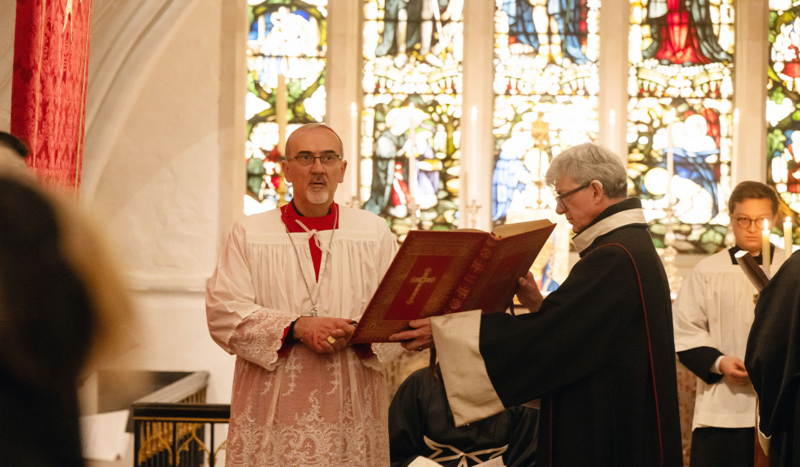
Catholic Church England and Wales / Flickr
CV NEWS FEED // The Latin Patriarch of Jerusalem, Cardinal Pierbattista Pizzaballa, said in his homily for the Mass at the conclusion of his visit to England that for all Christians, but especially for those suffering the consequences of war in the Holy Land, it is crucial to keep one’s eyes on Christ amid the stresses of this world.
Cardinal Pizzaballa said in the homily that during the visit to the UK, he has learned through a lot of “interesting, fruitful encounters” with his suffering flock that he found beautiful.
“I wanted to come to let our people know about the life of the Christians in the Holy Land,” he said. “In this very difficult period we are living through, I have experienced a lot of solidarity, closeness, and prayer for our reality in the Holy Land.”
Reflecting on the Gospel for the Mass, which was about Jesus’ words on His Second Coming into the world, and how He says it will be preceded by signs in the sky and the earth that will cause immense fear, Cardinal Pizzaballa noted that the constant nature of the stars, sun, and moon provide a certainty to people all around the world – so the upheaval of them causes immense stress.
“I live in the Holy Land where almost nothing is certain,” Cardinal Pizzaballa said. “Jesus says there are moments where life becomes stormy. This upheaval creates fear. People are afraid. They faint out of fear, as it says in the Gospel. And fear paralyses, fear closes.”
He noted that people are inclined to barricade and protect themselves when they are fearful, but Jesus instructs the opposite.
“He says in this moment, ‘raise your head’,” Cardinal Pizzaballa said. “He uses beautiful images. He says he’s coming on a cloud.”
The cloud in the Old Testament symbolized God’s presence, which accompanied the people of Israel in the book of Exodus, the Cardinal explained.
“So Jesus says, even in this moment when life is stormy, raise your head to look at the cloud,” he continued. “Don’t close yourself. Don’t let fear determine your choices in these difficult moments. Raise your heads, stand up.”
He added that looking “is not just a question of using your eyes, but a question of using your heart.” Prayer is essential to being able to look at reality rightly, and to having a heart that is not anxious and distracted by problems in the world, the Cardinal said: “Be awake and pray.”
This is a reflection that has informed his message to his local community, Cardinal Pizzaballa said. Every house in Gaza has been affected by the war, and over 2 million people have been displaced. Further, “there is hatred, mistrust, and fear,” he said. Relationships have been severely harmed by the war.
In time, after the end of the war, trust will need to be rebuilt among different peoples and faith communities, Cardinal Pizzaballa said. This will require prayer.
“We have to pray that the Holy Spirit will give all of us this ability to raise our heads to see beyond destruction everywhere,” he said, “to see how the Kingdom of God, despite everything, is still growing, is still present in the ‘little ones’ of the Gospel.”
He continued, “I take a lot of consolation visiting the communities. I see how they suffer. They lost almost everything, especially in Gaza, they lost their houses, their opportunities. They have nothing. But they are not able to say a word of anger. They are not able to express hatred despite everything. They say this, ‘We are Christians. We have Jesus.’”
The Cardinal later reiterated the importance of remaining close to Jesus amid the difficulties of life.
“My wish for all of us, is that we do not let the dramatic situations of the world determine our choices, our vision,” he said. “We have to look to Jesus – who comes in the Sacraments, in the Word of God, in the occasions of life – so we are able, with our heart and our eyes, to see, to look. We have to look. If you don’t look, you don’t find.”
Read his full homily here.

